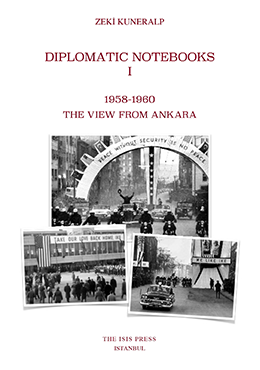Zeki Kuneralp, Diplomatic Notebooks 1, 1958-1960: The view from Ankara, ed. and introduced by Sinan Kuneralp (The Isis Press: Istanbul, 2018), ISBN 978-975-428-616-8/978-975-428-617-5, pp. 342, incl. name and analytical index. Publisher’s page
Zeki Kuneralp (1914-1998) was one of Turkey’s most gifted, well-liked and influential diplomats of the second half of the twentieth century. This book, dispassionately edited, introduced and annotated by his son, the scholar-publisher Sinan Kuneralp, is the first of a promised series of six volumes. Beginning in January 1958 and ending in August 1960, when Zeki Kuneralp became ambassador to Switzerland, it covers all but the first seven or eight months of the period when he was assistant secretary-general for political affairs in the Turkish foreign ministry in Ankara (in May 1960 he was elevated to secretary-general).
This volume consists mainly of notes taken by Kuneralp in his private meetings at the ministry with individual members of the Ankara diplomatic corps who called on him or whom – less frequently – he had summoned. But it also includes notes of encounters at the ministry with other foreign visitors, most of them important, and notes taken at meetings he attended where the Turkish principals were senior government figures. In the interests of clarity and accuracy, Kuneralp – who was fluent in English, French, German and Spanish, as well as Turkish – from 1959 onwards took his notes in the language used in the meetings. In the book, most are in English and those taken in Turkish are followed by square-bracketed translations into English; the introduction, footnotes and indexes are also in English.
For Turkey’s foreign relations, these were years dominated by questions concerning its role in the Western alliance systems, especially CENTO after the headquarters of the ‘Baghdad Pact’ were moved from Baghdad to Ankara following the overthrow in 1958 of the Hashemite monarchy in Iraq by Kassem; the implications for the Middle East of Nasserist Arab nationalism, including how to react to the formation of the United Arab Republic, also in 1958; and the tangled and explosive Cyprus question, the diplomacy concerning which was gathering pace in these years. Any scholar interested in these subjects will find a wealth of primary source material of great interest in this volume. As for what it reveals about diplomacy itself, I was struck in particular by the degree to which Kuneralp’s meetings with ambassadors, chargé d’affaires, ministers (legation heads), counsellors and others were dominated by the trading of information on questions of common concern. Some of his visitors turned up at his office with great regularity and all pumped him for information, chiefly on what Turkey knew about particular developments in the region, what its attitude to them was, and what if any action it proposed to take. Depending on the visitor, he responded to such questions with more or less freedom – but invariably expected a quid pro quo. He required answers to the same sort of questions about their own countries intelligence and reactions, including assurances of their support for Turkish policy. Typical, as well as absorbing in its own right, were his exchanges with the Israeli chargéd’affaires, Moshe Alon, who on one occasion (16 October 1958) was accompanied by Reuven Shiloah, the founder of the Israeli secret service, Mossad. Shiloah was roving ambassador and political adviser to the Israeli foreign minister, and originator and active promoter of the idea that Israel should leapfrog its Arab enemies and seek strategic alliances with the non-Arab states on the perimeter of the Middle East such as Iran, Ethiopia – and Turkey. Between January 1958 and 20 August 1960, Alon and Kuneralp had 41 meetings, all of which are fully recorded in this volume.
Diplomatic Notebooks 1 is a highly unusual book. It bears no resemblance whatever to the common diplomatic memoir; nor is it, despite the similarity of its formatting, a diary, for as the Editor says, ‘the human aspect is absent’. This calls to mind the contrast with Harold Nicolson’s justly famous diaries, written with wit and elegance, and containing many insights into the personalities of the great politicians and diplomats of his day as well as his own family life and personal ambitions. But the contents of Diplomatic Notebooks 1were not written with such ends in view. They were composed by Zeki Kuneralp simply as aids to an accurate memory of his official meetings, essentially as personal ‘minutes’, and – being carefully dated, full and yet succinct – they provide an invaluable resource for both the international historian and the historian of diplomacy. I recommend this book most strongly and look forward very much to the following volumes.



